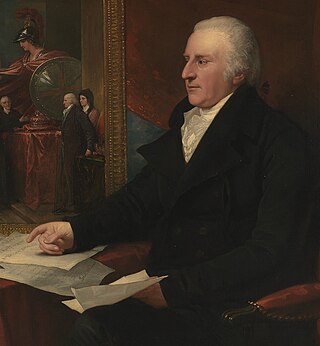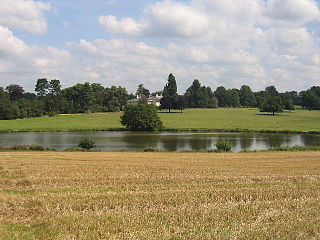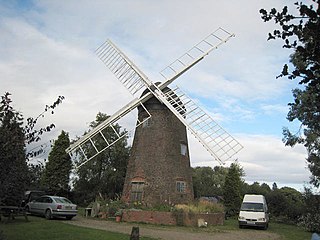Related Research Articles

Earl of Verulam is a title in the Peerage of the United Kingdom. It was created in 1815 for James Grimston, 4th Viscount Grimston. He was made Viscount Grimston at the same time. Verulam had previously represented St Albans in the House of Commons. In 1808 he had also succeeded his maternal cousin as tenth Lord Forrester. He was succeeded by his son, the second Earl.
Baron Swaythling, of Swaythling in the County of Southampton, is a title in the Peerage of the United Kingdom. It was created in 1907 for the British Jewish Liberal politician, banker and philanthropist, Sir Samuel Montagu, 1st Baronet. He had already been created a Baronet, of South Stoneham House in the County of Southampton and of Kensington Palace Gardens in the County of London, in 1894. As of 2010, the titles are held by his great-great-grandson, the fifth Baron, who succeeded his father in 1998.

Berkswell railway station, in the West Midlands of England, takes its name from the nearby village of Berkswell although it is located on the northern edge of the village of Balsall Common. The station originally opened in 1844 as Docker's Lane, changed to Berkswell on 1 January 1853, then to Berkswell & Balsall Common on 1 February 1928 before reverting to Berkswell again in 1955.

Berkswell is a village and civil parish in the Metropolitan Borough of Solihull, county of West Midlands, England. Historically in Warwickshire, Berkswell is situated in the rural east of the borough, approximately 2 miles (3.2 km) west of the western city boundary of Coventry, at Eastern Green. It is situated about 6.5 miles (10.5 km) west of Coventry city centre, 8.5 miles (13.7 km) east of central Solihull, 2.5 miles (4.0 km) south of Meriden and 2 miles (3.2 km) north of Balsall Common.

Baron Masham is a title that has been created three times, once in the Peerage of Great Britain and twice in the Peerage of the United Kingdom. It was first created in the Peerage of Great Britain in 1712 when the courtier Samuel Masham was made Baron Masham, of Otes. In 1723 he also succeeded as fourth Baronet of High Lever. The barony became extinct on the death of the second Baron in 1776. The Masham baronetcy, of High Lever in the County of Essex, had been created by James I in the Baronetage of England on 20 December 1621 for Samuel Masham. The third Baronet was Member of Parliament for Essex. The baronetcy became extinct along with the barony in 1776.

Offchurch Bury is a manor house one mile north-west of the centre of the village of Offchurch, Warwickshire, England. It is supposed to represent the site of a palace of the Anglo-Saxon King Offa of Mercia (d.796), after which Offchurch is named, "bury" being a corruption of "burh" meaning a fortified place. William Dugdale in his Antiquities of Warwickshire (1656) stated concerning the manor of Offchurch:

This is a list of Sheriffs of Derbyshire from 1567 until 1974 and High Sheriffs since.
There have been five baronetcies created for people with the surname Forbes, four in the Baronetage of Nova Scotia and one in the Baronetage of the United Kingdom. The first holder of the Burn baronetcy of Jessfield, created in the Baronetage of the United Kingdom in 1923, assumed the surname of Forbes-Leith of Fyvie in 1925.
This is a list of sheriffs and high sheriffs of the English county of Warwickshire.
There have been three baronetcies created for persons with the surname Wilmot, one in the Baronetage of Ireland and two in the Baronetage of Great Britain. One creation is extant as of 2008.
The following is a list of events from the year 1629 in Ireland.

The Eardley-Wilmot Baronetcy, of Berkswell Hall in the County of Warwick, is a title in the Baronetage of the United Kingdom. It was created on 23 August 1821 for the politician and colonial administrator John Eardley-Wilmot. He was Lieutenant-Governor of Van Diemen's Land from 1843 to 1846. Eardley-Wilmot was the son of John Wilmot, barrister-at-law and one of the Masters-in-Chancery, who in 1812 had assumed by royal licence the additional surname of Eardley as the great-grandson of Elizabeth, sole heiress of Edward Eardley, of Eardley, Staffordshire, and the grandson of John Eardley Wilmot, Chief Justice of the Common Pleas from 1766 to 1771. The second baronet was a judge and also sat as Conservative Member of Parliament for Warwickshire South. Another member of the family to gain distinction was Frederick Marow Eardley-Wilmot, second son of the first baronet. He was a major general in the army.

Sir John Eardley Wilmot PC SL, was an English judge, Chief Justice of the Common Pleas from 1766 to 1771.

Berkswell Hall is a 19th-century country house at Berkswell, formerly Warwickshire now West Midlands, now converted into residential apartments. It is a Grade II* listed building.
There have been two baronetcies created for persons with the surname Hyde. Both are extinct.
John Eardley Wilmot was a British lawyer and politician who sat in the House of Commons from 1776 to 1796.
The Jervoise, later Clarke-Jervoise Baronetcy, of Idsworth in the County of Southampton, was a title in the Baronetage of the United Kingdom. It was created on 13 November 1813 for Rev. Samuel Jervoise, born Samuel Clarke, who assumed the surname of Jervoise by royal licence in 1808.

Berkswell windmill is a four bladed tower mill constructed in 1826 on the site of a former post mill, in the village of Balsall Common, in the parish of Berkswell, in the Metropolitan Borough of Solihull, West Midlands. The windmill is built in brick with a wooden boat shaped cap, and is turned into the wind by an endless chain winding mechanism. It was historically used to grind flour and animal feeds, and in 1927 the milling wheels were adapted to run via a diesel engine, not reliant upon the variable nature of the wind. The mill was finally closed in 1948, after the last miller John Hammond died.

Berkswell is a hard cheese, made at Ram Hall Farm near Berkswell, West Midlands, England. It is made using unpasteurised ewe milk and animal rennet. The moulds of cheeses are left in plastic kitchen colanders which give the cheese its distinctive shape. Berkswell may be compared to a mature pecorino.